- Home
- Darynda Jones
Second Grave on the Left Page 14
Second Grave on the Left Read online
Page 14
“A few weeks before Mimi moved to Albuquerque, a girl from her class disappeared.”
I downshifted and eased Misery into the right-hand lane to exit. “What happened?” I asked above the honking and shrill screams. “Need therapy much?” I yelled back.
“Nobody knows. They never found her body.”
“That’s interesting.”
“Yeah. It’s really sad. According to a five-year-old news article, her parents still live in Ruiz. They’ve lived in the same house for twenty years, hoping their daughter would find her way home.”
That was quite common, actually. When parents had no closure, they were often afraid to move for fear of their child returning to find them gone. “Closure, good or bad, is not overrated.”
“And guess what her name was.”
“Um—”
“Hana Insinga.”
Ah. The Hana part of Mimi’s message on the bathroom wall at the diner. “Be there in two,” I said before hanging up.
* * *
“Here’s the address,” Cookie said, climbing into Misery.
“Who’s going to man the phones?” I didn’t really care, but somebody had to give Cook a hard time, damn it. It may as well be me.
“I’m forwarding all the calls to my cell.” She had a stack of papers, file folders, and her laptop with her as well.
“It’s a good thing. I’m not paying you to tour the country like a rock star.”
“Do you pay me? I feel more like a slave.”
“Please, you’re way cheaper than a slave. You provide your own shelter, pay your own bills.”
Ever the multitasker, she stuck her tongue out and clicked her seat belt at the same time. Show-off. I saw an opening and floored it onto Central. Timing was everything. The files flew off Cookie’s lap. She grabbed for them then yelped. “Paper cut!”
“That’s what you get for sticking your tongue out at me.”
Sucking on the side of her finger, she cast a vicious scowl before pulling her hand back to get a good look at her injury. “Does workman’s comp cover paper cuts?”
“Do chickens lay snowballs?”
* * *
Just over two hours later, we were sitting in a charming living room in Ruiz with a lovely woman named Hy who served us Kool-Aid in teacups. Hy looked part Asian, most likely Korean, but her husband had been a blond-haired, blue-eyed pilot in the navy, and they’d met when he was on leave in Corpus Christi, Hy’s hometown set in the deep south of Texas. And she had the twang to prove it. She was tiny with a round face and graying black hair cut in a bob along her jaw. The white blouse and khaki pants she wore helped her seem younger than her years, though she looked as delicate as the teacups she handed us.
“Thank you,” I said when she offered me a napkin.
“You want cookies?” she asked, her Texas accent at odds with her Asian features.
“No, thank you,” Cookie said.
“I’ll be back.” She rushed off to the kitchen, her flip-flops padding along the carpet as she walked.
“Can I just take her home with me?” Cookie asked. “She’s adorable.”
“You can, but that’s called kidnapping and is actually frowned upon by many law enforcement agencies.” I chuckled into my teacup when she offered me a scowl. Apparently, paper cuts made her grumpy.
Hy trod back with a plate of cookies in her hands. I smiled as she handed it to me. “Thank you so much.”
“Those are good cookies,” she said, sitting in a recliner opposite us.
After placing one on my napkin, I handed the plate to Cook. “Mrs. Insinga, can you tell us what happened?”
We’d told her we were here to ask her about her daughter when we introduced ourselves on her doorstep. She was kind enough to let us in.
“That was so long ago,” she said, withdrawing inside herself. “I can still smell her hair.”
I put my cup down. “Do you have any idea what happened?”
“Nobody knows,” she said, her voice faltering. “We asked everybody. The sheriff interviewed all the kids. Nobody knew anything. She just never came home. Like she disappeared off the face of the Earth.”
“Did she go out with a friend that night?” The pain of her daughter’s disappearance resurfaced, emanated out of Hy. It was disorienting. It made my heart pound, my palms sweat.
“She wasn’t supposed to leave. She snuck out her window, so I have no idea if she was with anyone.”
Hy was struggling to control her emotions, and my heart went out to her.
“Can you tell me who her closest friends were?” I asked. Hopefully we would at least leave with a few contacts.
But Hy shook her head in disappointment. “We’d lived here only a few weeks. I hadn’t met any of her friends yet, though she did talk about a couple of girls from school. I’m not positive they were close—Hana was painfully shy—but she said one girl was very nice to her. After Hana disappeared, the girl moved to Albuquerque to live with her grandmother.”
“Mimi Marshal,” I said sadly.
She nodded. “Yes. I told the sheriff they were friends. He said he questioned all the high school children. Nobody knew anything.”
I couldn’t ethically bring up Kyle Kirsch’s name. We had no evidence that he was actually involved in any of this. But I decided to approach it from a different angle. “Mrs. Insinga, were there any boys? Did she mention a boyfriend?”
Hy folded her hands in her lap. I got the feeling she didn’t want to think of her daughter in that way, but the girl was at least fifteen when she disappeared, possibly sixteen. Boys were very likely a big part of her thought process.
“I don’t know. Even if she had liked someone, she would never have told us. Her father was very strict.”
“I’m so sorry for your loss,” I said when she mentioned her husband. She’d told us he died almost two years ago.
She bowed her head in gratitude. After steering the conversation to greener fields, asking about her hometown and what she missed most about Texas, Cookie and I stood and walked to the door.
“There is something else,” she said as she led us out. Cookie was already headed toward the Jeep. “We began getting money deposited directly into our account every month about ten years ago.”
I stopped and turned to her in surprise.
“I didn’t want to believe it had anything to do with Hana, but I have to be honest with myself. Why would anyone give us money for no reason?”
That was a good question. “Is it transferred from another account?”
She shook her head. Of course not. That would have been too easy. “It’s always a night deposit,” she added. “One thousand dollars cash on the first of every month. Like clockwork.”
“And you have no idea who it is?”
“None.”
“Did you talk to the police?”
“I tried,” she said with a shrug, “but they didn’t want to waste the resources to stake out either bank location when there really wasn’t a crime being committed. Especially since we refused to file any charges.”
I nodded in understanding. It would have been a hard point to argue with the authorities.
“My husband and I had tried a few times to see who was doing it, but if we were staking out one location, the deposit was made at the other. Every time.”
“Well, it’s certainly worth looking into. May I ask you one more question?” I asked as Cookie turned at the end of the sidewalk to wait for me.
“Of course,” she said.
“Do you remember who the sheriff was at the time of Hana’s disappearance? Who the lead investigator was?”
“Oh, yes. It was Sheriff Kirsch.”
My heart skipped a beat, and a soft gasp slipped through my lips. Hoping my surprise didn’t alarm her, I said, “Thank you so much for your time, Mrs. Insinga.”
After we left, Cookie and I sat in Misery—the Jeep, not the emotion—a stunned expression on both our faces. I’d told her who the sheriff on th
e case had been.
“Let me ask you something,” I said to Cookie as she stared into space. “You told me Warren Jacobs is wealthy, right? He writes software programs for businesses all over the world.”
“Mm-hmm,” she hummed absently without looking at me.
“Then why does Mimi work?”
She turned to me then, her expression incredulous. “Just because her husband is wealthy, she can’t have a job? A little independence? An identity of her very own?”
I held up a palm. “Cook, can we put the feminist movement on hold for a moment? I’m asking for a reason. Hy told me someone has been making night deposits, putting a thousand bucks into her banking account on the first of every month for the last ten years. Harold and Wanda said Mimi visits them religiously. She brings the kids and stays the night with them on the first of every month. Cook, Mimi is making those deposits.”
She took a moment to think about what I said, then lowered her head and nodded in resignation. “But that would mean she feels guilty about something, wouldn’t it?”
“It would seem that way. But people feel guilty for different reasons, Cook. It doesn’t mean she did anything wrong.”
“She told her mom she’d made a mistake. Charley, what happened?”
“I don’t know, sweetheart, but I’ll find out. And I’d bet Garrett’s left testicle, it has something to do with our Senate hopeful.”
I turned the ignition key. Misery roared to life as Cookie stared out her plastic window.
“Do you have any idea what this means?” she asked.
“Besides the fact that Kyle Kirsch is most likely a murderer?”
“This means that we are about to bring felony charges against a United States congressman. A man who is hoping to be our next senator. A hometown hero and pillar of the community.”
Was Cookie having second thoughts because he was a bigwig? Bigwigs had to follow the constructs of the law just like medium-sized and little wigs.
She turned a starry-eyed expression on me, her aura brimming with a fiery passion. “God, I love this job.”
Chapter Ten
I WAS AN ATHEIST UNTIL I REALIZED I WAS GOD.
—BUMPER STICKER
By the time we stopped at the Mora County Sheriff’s Department, Cookie was on fire. She was taking charge of the investigation and doing a pretty good job of it, too. If you didn’t count the dropped calls, the slow Internet access, and the lashing from an eighty-year-old woman claiming she was Batman when Cookie dialed a wrong number. Cook was getting a little annoyed with my repeated impersonation of the woman. She really shouldn’t have put her on speakerphone if she didn’t want to reap the consequences.
After we climbed out of Misery, she pushed past me and said, “You’re messing with my flow.”
I tried not to giggle—well, not real hard—and asked, “Didn’t you have surgery for that?”
Unfortunately, the current head honcho was out on business. The clerk told us the former sheriff, Kyle Kirsch’s dad, was now living in Taos with his wife, working in security, so we didn’t get to chat with him this go-around. But the clerk did give us copies of everything they had on the Hana Insinga case for the low cost of a round-trip ticket to a dark and dank basement and the shuffling of a few file boxes.
The clerk herself was too young to remember the case, which was a bummer. But I was sure with all the hoopla going on underneath all the hoopla going on up top, we would ruffle a few feathers just for the asking. If nothing else, we would get Kyle’s attention, and fast. Of course, between the fake FBI agents and my new friends from this morning, we may already have revealed our secret hideout and nefarious plans to stop Kyle Kirsch from taking over the world.
I sort of got off on making bad guys sweat. Which was not unlike my love of making good guys sweat, just by very different means.
On the way back, we had to pass through Santa Fe, which gave me the perfect opportunity to have a one-on-one with Neil Gossett, a deputy warden at the prison there. Actually, he’d called while we were en route and pretty much insisted that I stop and see him. He had his assistant schedule us an appointment, as prisons were big on appointments.
“Do you think Neil will give you access to that kind of information?” Cookie asked when she got off the phone with her daughter, Amber. From the sound of things, Amber was having a good time at her dad’s, which seemed to ease Cookie’s concerns. “I mean, aren’t visitation records kind of confidential?”
“First things first,” I said as we drove to the prison. I took out my cell and called Uncle Bob.
“Oh,” Cookie said, tapping keys on her laptop. “Your Mistress Marigold just answered my e-mail.”
“Really? Did she mention me?”
She chuckled. “Well, I asked her what she wanted with the grim reaper, and she said, and I quote, ‘That is between me and the grim reaper.’”
“She did mention me! She’s nice.”
Cookie nodded as Uncle Bob answered, his tone brusque. “What have you got?”
“Besides great boobs?” I asked.
“On the case.”
He was so testy. “Do you want the whole shebang or just a partial?”
“All of it, if you don’t mind.”
Thus I spilled our entire case for the next ten minutes while Cookie did some research on her laptop. She barked out a few details from time to time, apparently dissatisfied with my rendition of Kyle Kirsch Takes Over the World: The Musical.
After a long pause that had me wondering if he’d finally succumbed to his blocked arteries, I heard some huffing and puffing and a door squeak just before he whispered, “Kyle Kirsch?”
“Where are you?”
“I’m in the freaking john. You can’t go around saying shit like that out loud in public. Kyle Kirsch?”
“Yep.”
“The Kyle Kirsch?”
His synapses must have been misfiring. “I have to go to prison now. Let me know when your software has been updated, and we’ll chat.”
“Okay, wait,” he said just before I hung up, “let me look into the missing-girl case. Don’t do anything rash.”
“Me?” I was only a little offended.
“You stir up more hornets’ nests than a twelve-year-old boy with a baseball bat. You’re like Lois Lane on crack.”
“Well, I never. So, do you have anything else for me?”
“No.”
“Darn.”
“Are you going to stay out of trouble?”
“What? K-shhhhhhh. You’re breaking up.” I hung up before he could say anything else. If I was Lois Lane, then Reyes Farrow was definitely my Superman. I just had to find him before the kryptonite demons finished what they started. The fact that I hadn’t seen him all day did not escape me. Did he die? Was he already gone? The mere thought caused a crushing weight to push against my chest. I breathed in deep, calming breaths as we pulled up to the main gate of the prison.
“According to the write-up in the paper, Janelle York is survived by a sister, but she lives in California now,” Cookie said.
“Wow, that’s a bit far to drive. We’re here to see Neil Gossett,” I told the guard.
He scanned a clipboard, his posture like a soldier at attention. “Do you have an appointment?”
“Sure do,” I said, letting a flirtatious smile slide across my face. “My name is Charlotte Davidson, and this is Cookie Kowalski.”
A grin threatened the corners of his mouth. He was too young to be jaded and too old to be naïve. A darned good age, in my book. “I only have you down, Ms. Davidson. Let me call up,” he said.
I widened my smile, which in my experience could open more doors than an AK-47. He forced his mouth to stay grim, but his eyes smiled right back before he turned and strode to the guardhouse.
“Maybe Janelle’s sister came down for the funeral,” Cook added. “I’ll call the funeral home, try to get the contact information.”
As she typed in a search for the number, the guard wal
ked back to us, the grin still trying to push past the harsh line of his mouth. “You’re clear. If you’ll just follow this road around,” he said, pointing to the right, “it’ll take you right to his building.”
“Thank you.”
Ten minutes later, I found myself once again in the state pen. Well, in Neil Gossett’s office in the state pen, anyway. Cookie stayed in the outside office to do some more research and make a few calls. She was so productive. I heard Neil coming. He greeted Cookie then stopped to speak with Luann, his administrative assistant, the one who met us at the entry and eyed me like I was out to kill her puppy every time I visited. She had pale skin that revealed every bit of her forty-plus years and contrasted starkly with her short black hair and dark eyes. I’d always wondered why she glared at me every time I came in. Never enough to ask, but still. All I got in the way of emotion was distrust, but thinking back to the first time I’d met her, I didn’t even feel that until she found out I was there about Reyes. She seemed almost protective of him, and I suddenly wondered why.
Neil thanked Luann, then started toward his office. He and I went to high school together, but our paths had rarely crossed. Mostly ’cause he was a jerk. Thank goodness prison life had matured him. And because of an incident that happened when Reyes first arrived here ten years ago, which involved the downfall of three of the deadliest gang members the prison population had to offer in about fifteen seconds flat, Neil knew a smidgen about Reyes. Whatever Neil saw left an impression. And he knew just enough about me to believe anything I said, no matter how crazy it sounded. That had not been the case in high school, where I had been called everything from schizoid to Bloody Mary—which was odd ’cause I was rarely covered in blood. But now I could use his newfound faith in my abilities to my advantage, and I was counting on that trust to make my case.
He stepped into the office and cast a knowing glance my way before settling behind his desk. Neil was a balding ex-athlete who still had a fairly nice physique despite his obvious fondness for libation.
“Have you seen him?” he asked, getting right to the point. He was going to be all business for the time being. That worked. And it made sense that he wanted to know where Reyes was, him being the deputy warden of the prison Reyes essentially escaped from and all.

 For I Have Sinned
For I Have Sinned First Grave on the Right
First Grave on the Right The Trouble With Twelfth Grave
The Trouble With Twelfth Grave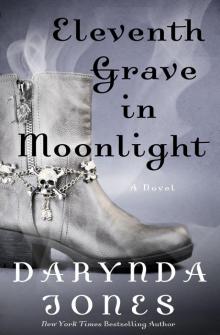 Eleventh Grave in Moonlight
Eleventh Grave in Moonlight Brighter Than the Sun
Brighter Than the Sun The Dirt on Ninth Grave
The Dirt on Ninth Grave Fifth Grave Past the Light
Fifth Grave Past the Light Death, Doom and Detention
Death, Doom and Detention Third Grave Dead Ahead
Third Grave Dead Ahead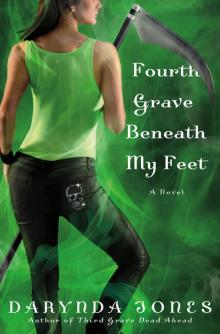 Fourth Grave Beneath My Feet
Fourth Grave Beneath My Feet Death and the Girl Next Door
Death and the Girl Next Door Eighth Grave After Dark
Eighth Grave After Dark Second Grave on the Left
Second Grave on the Left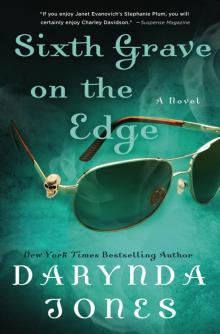 Sixth Grave on the Edge
Sixth Grave on the Edge The Curse of Tenth Grave
The Curse of Tenth Grave Bewitched: A Paranormal Women's Fiction Novel (Betwixt & Between Book 2)
Bewitched: A Paranormal Women's Fiction Novel (Betwixt & Between Book 2) Seventh Grave and No Body
Seventh Grave and No Body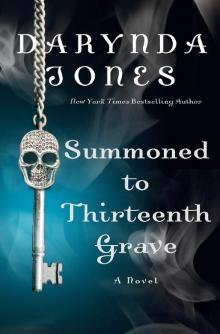 Summoned to Thirteenth Grave (Charley Davidson #13)
Summoned to Thirteenth Grave (Charley Davidson #13) A Good Day for Chardonnay
A Good Day for Chardonnay Death, and the Girl He Loves
Death, and the Girl He Loves A Bad Day for Sunshine--A Novel
A Bad Day for Sunshine--A Novel Beguiled
Beguiled The Graveyard Shift: A Charley Davidson Novella
The Graveyard Shift: A Charley Davidson Novella Death and the Girl Next Door d-1
Death and the Girl Next Door d-1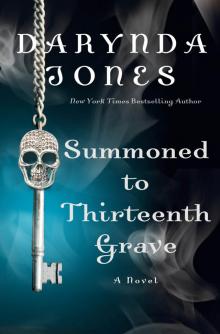 Summoned to Thirteenth Grave
Summoned to Thirteenth Grave First Grave on the Right cd-1
First Grave on the Right cd-1 Fifth Grave Past the Light: Number 5 in series (Charley Davidson)
Fifth Grave Past the Light: Number 5 in series (Charley Davidson) Third Grave Dead Ahead cd-3
Third Grave Dead Ahead cd-3 Second Grave on the Left cd-2
Second Grave on the Left cd-2